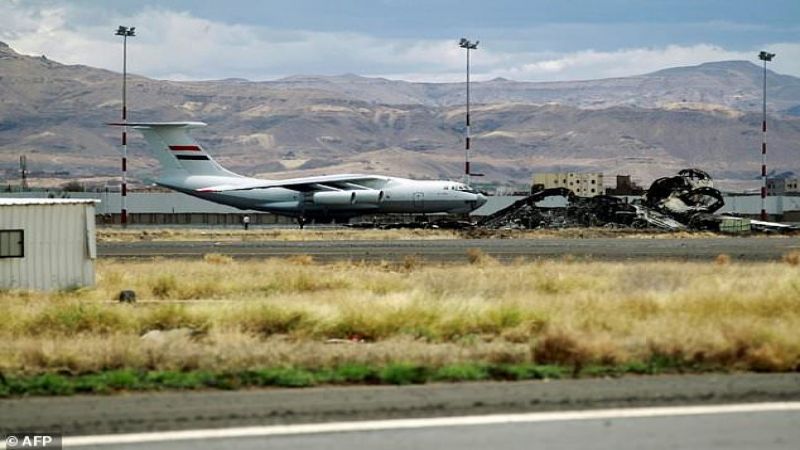
Local Editor
The Saudi-led military coalition bombed Yemen’s international airport in the capital, Sana’a, on Tuesday, Yemeni officials said.
The United Nations said most of the airport remained intact and that it would be able to receive aid shipments once the coalition follows through on its announced loosening of the blockade of the war-torn country.
But Yemeni officials in Sana’a said the airport's runway and a ground navigation tower were damaged. Repair crews were already at work, they added, speaking on condition of anonymity.
Jamie McGoldrick, of the U.N. Office for the Coordination of Humanitarian Affairs, said U.N. staff had visited the airport and spoken with authorities there, and that its "runway, taxiway, ramp, terminal and air traffic control tower were not hit and are in good condition."
"This will have no impact on our operations once they resume," McGoldrick said in an email from Amman, Jordan.
The U.S.-backed coalition has bombing Yemen since March 2015. The coalition closed all air, land and sea ports last week in response to retaliatory attack by the Houthi Ansarullah movement on Riyadh.
The coalition said Monday that it would reopen ports in areas held by allied forces and loosen restrictions it had tightened after the firing of the missile, which was intercepted near Riyadh's international airport.
However, McGoldrick said earlier in the day that there was "no indication" the coalition was actually lifting the blockade in line with its announcement.
He said that coalition announcements of the availability of two ports in southern Yemen are "helpful," but that the key need is access to the rebel-held Red Sea ports of Salif and Hodeida, closer to large population centers.
U.N. spokesman Stephane Dujarric told reporters at U.N. headquarters in New York that without Sana’a airport and Hodeida and Salif seaports fully functioning and able to receive cargo, "the dire humanitarian situation will deteriorate further."
He said U.N. humanitarian officials are warning that "seven million people are already on the brink of famine, and the blockade will only bring them closer to it."
Dujarric said the U.N. refugee agency expressed alarm at the worsening humanitarian situation, noting that at a center for displaced Yemenis in Sana’a "hundreds more people are approaching the facility daily, saying they are no longer able to meet basic needs or afford medical care."
The agency reported that the closure of Yemen's border has halted the delivery of emergency assistance for nearly 280,000 internally displaced people, and stranded some of its staff outside the country while others lack fuel for transport, he said.
Source: News Agencies, Edited by Website Team
Saudi-Led Coalition Bombs Airport Runway In Yemen's Capital
Local Editor
The Saudi-led military coalition bombed Yemen’s international airport in the capital, Sana’a, on Tuesday, Yemeni officials said.
The United Nations said most of the airport remained intact and that it would be able to receive aid shipments once the coalition follows through on its announced loosening of the blockade of the war-torn country.
But Yemeni officials in Sana’a said the airport's runway and a ground navigation tower were damaged. Repair crews were already at work, they added, speaking on condition of anonymity.
Jamie McGoldrick, of the U.N. Office for the Coordination of Humanitarian Affairs, said U.N. staff had visited the airport and spoken with authorities there, and that its "runway, taxiway, ramp, terminal and air traffic control tower were not hit and are in good condition."
"This will have no impact on our operations once they resume," McGoldrick said in an email from Amman, Jordan.
The U.S.-backed coalition has bombing Yemen since March 2015. The coalition closed all air, land and sea ports last week in response to retaliatory attack by the Houthi Ansarullah movement on Riyadh.
The coalition said Monday that it would reopen ports in areas held by allied forces and loosen restrictions it had tightened after the firing of the missile, which was intercepted near Riyadh's international airport.
However, McGoldrick said earlier in the day that there was "no indication" the coalition was actually lifting the blockade in line with its announcement.
He said that coalition announcements of the availability of two ports in southern Yemen are "helpful," but that the key need is access to the rebel-held Red Sea ports of Salif and Hodeida, closer to large population centers.
U.N. spokesman Stephane Dujarric told reporters at U.N. headquarters in New York that without Sana’a airport and Hodeida and Salif seaports fully functioning and able to receive cargo, "the dire humanitarian situation will deteriorate further."
He said U.N. humanitarian officials are warning that "seven million people are already on the brink of famine, and the blockade will only bring them closer to it."
Dujarric said the U.N. refugee agency expressed alarm at the worsening humanitarian situation, noting that at a center for displaced Yemenis in Sana’a "hundreds more people are approaching the facility daily, saying they are no longer able to meet basic needs or afford medical care."
The agency reported that the closure of Yemen's border has halted the delivery of emergency assistance for nearly 280,000 internally displaced people, and stranded some of its staff outside the country while others lack fuel for transport, he said.
Source: News Agencies, Edited by Website Team